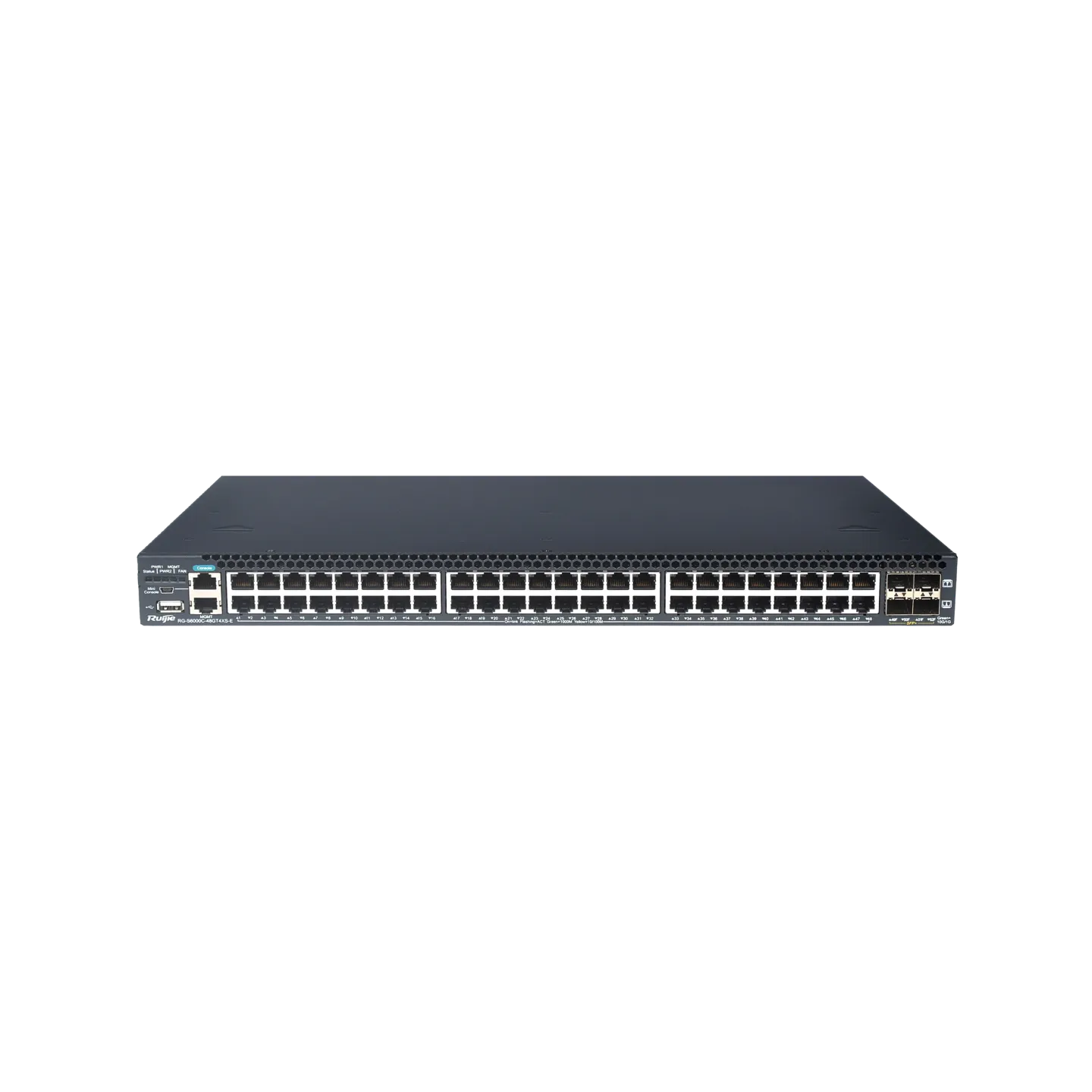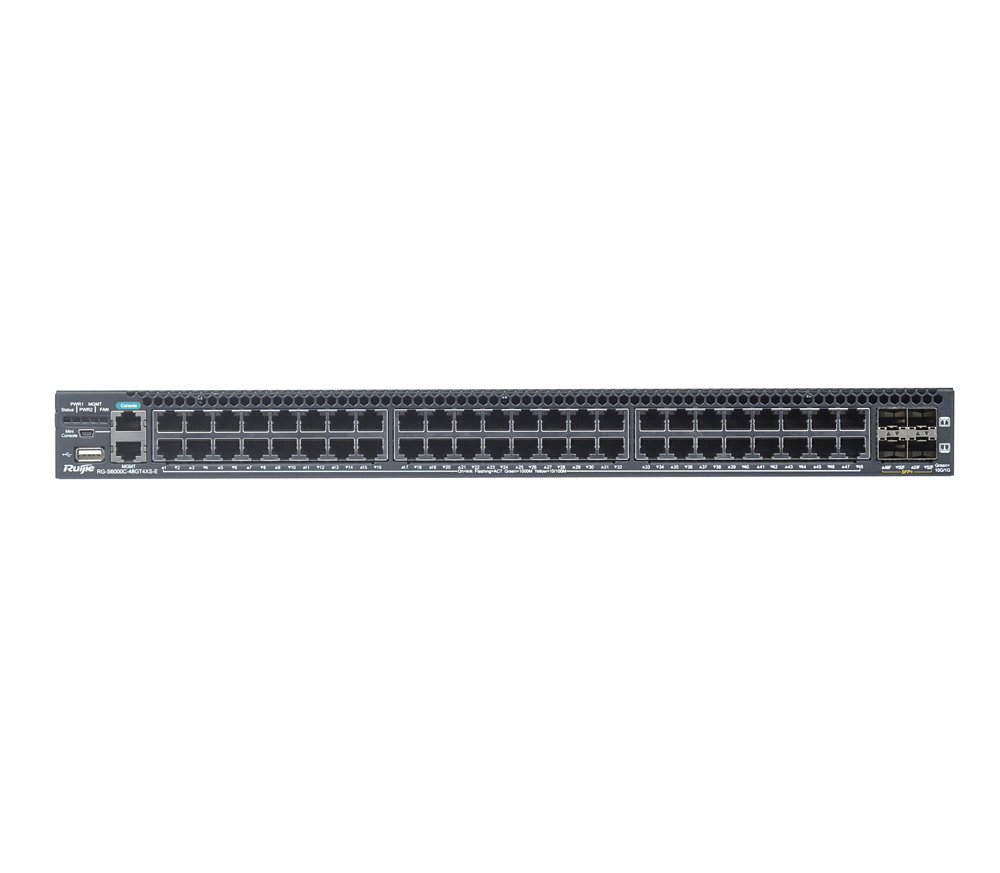Setting Up a Non-Blocking Data Center Network
The RG-S6000C-48GT4XS-E provides 48 x 1GE ports, 4 x 10GE ports, and 1 x expansion module slot. All ports support data forwarding at the line rate to better handle heavy east-west traffic. This makes the RG-S6000C-48GT4XS-E applicable to non-blocking networking of data centers with heavy traffic.
Data Center Virtualization
The RG-S6000C-48GT4XS-E adopts the virtual switching unit (VSU) technology to virtualize multiple physical devices into one logical device, which reduces network nodes and enhances network reliability. The switch implements fast switchover within 50 ms to 200 ms upon a link failure, thereby ensuring nonstop transmission of key service traffic. Inter-device link aggregation enables the RG-S6000C-48GT4XS-E to connect to access servers and switches through dual active uplinks.
The RG-S6000C-48GT4XS-E supports Virtual Ethernet Port Aggregator (VEPA) defined in IEEE802.1Qbg. It can divert data flows generated by virtual machines (VMs) on a server to a physical network device for hard switching. This implements traffic policing of VMs and enforces access control policies uniformly. Compared with soft switching, hard switching does not occupy server resources. All these make the next-generation data center network solution better adapt to the virtual computing environment.
The RG-S6000C-48GT4XS-E supports VM detection and automatic migration of security policies. Security policies can be deployed uniformly for VM traffic in a large-scale server virtualization environment. Moreover, it can be used with the data center network management platform and VM management control platform. In this context, security policies can be migrated accordingly when VMs migrate on the entire network. This prevents network security vulnerabilities in the server virtualization environment and improves network maintenance efficiency.
Carrier-Class Reliability Protection
The RG-S6000C-48GT4XS-E supports modular power modules in 1+1 redundancy mode. All power modules and line cards can be hot swapped, and support overcurrent protection, overvoltage protection, and overheating protection, ensuring device-level reliability.
The switch also supports a wide range of link-level reliability technologies including the Rapid Link Detection Protocol (RLDP), Rapid Ethernet Uplink Protection (REUP), and Virtual Router Redundant Protocol (VRRP), Spanning Tree Protocol (STP), Rapid Spanning Tree Protocol (RSTP), and Multiple Spanning Tree Protocol (MSTP). The switch also features Graceful Restart (GR) and Bidirectional Forwarding (BFD). On the network that carries multiple services and heavy traffic, these mechanisms enable fast network convergence and ensure smooth service rollout.
IPv4/IPv6 Dual-Stack Protocols and Multilayer Switching
The hardware of the RG-S6000C-48GT4XS-E supports IPv4 and IPv6 protocol stacks and multilayer line-rate switching, and differentiates and processes IPv4 and IPv6 packets. The switch also supports multiple tunneling technologies such as manually configured tunnels and Intra-Site Automatic Tunnel Addressing Protocol (ISATAP) tunnels. It is flexibly applicable to IPv6 inter-network communication solutions based on IPv6 network planning and network status quo.
The switch supports abundant IPv4 routing protocols, including static routing, Routing Information Protocol (RIP), Open Shortest Path First (OSPF), Intermediate System to Intermediate System (IS-IS), and Border Gateway Protocol version 4 (BGP4).
The switch also supports various IPv6 routing protocols, including IPv6 static routing, Routing Information Protocol next generation (RIPng), OSPFv3, IS-IS v6, and BGP4+. You can flexibly select an IPv6 routing protocol to upgrade the live network to an IPv6 network or establish a new IPv6 network.
Flexible and Complete Security Policies
The RG-S6000C-48GT4XS-E can effectively defend against virus and hacker attacks through multiple inherent mechanisms, such as DoS attack defense, IP scanning attack defense, ARP packet validity check, and multiple hardware-based ACLs.
The hardware-based IPv6 ACLs can easily control the access of IPv6 users at the network edge even if there are IPv6 users on an IPv4 network. The switch allows IPv4 and IPv6 users to coexist and can control access permissions of IPv6 users, for example, restricting access to sensitive resources on a network.
The switch provides CPU Protection Policy (CPP), an industry-leading hardware-based CPU protection mechanism. CPP enables the switch to classify data traffic sent to the CPU, process the traffic by queue priority, and apply rating limiting on traffic as required. CPP fully protects the CPU from being occupied by unauthorized traffic, malicious attacks, and resource consumption, which ensures the security of the CPU and switch.
The switch and its ports can be flexibly bound to a user’s IP address and MAC address, which strictly restricts the access of users connected to the ports or the switch.
DHCP snooping enables the switch to receive DHCP messages only from trusted ports and prevent spoofing from unauthorized DHCP servers. With DHCP snooping, the switch dynamically monitors ARP packets, checks users' IP addresses, and discards unauthorized packets that do not match binding entries, thereby effectively preventing ARP spoofing and source IP address spoofing.
The switch supports Telnet access control based on source IP addresses, which prevents unauthorized users and hackers from maliciously attacking and controlling the switch, thus enhancing network management security.
Through the Secure Shell (SSH) and Simple Network Management Protocol version 3 (SNMPv3), the switch can encrypt management information in Telnet and SNMP processes. This ensures information security of management devices and prevents hackers from attacking and controlling the devices.
The switch rejects unauthorized network access and enables authorized network access by employing multi-tuple binding, port security, time-based ACL, and traffic-based rate limiting. The switch can strictly control user access to enterprise networks and campus networks and restrict communication of unauthorized users.
Software-Defined Networking
The RG-S6000C-48GT4XS-E supports OpenFlow 1.3, and can work with Ruijie Networks' SDN Controller to easily realize large-scale 2-layer networking with a data center architecture. It also supports smooth upgrade of the entire network to an SDN network, which greatly simplifies network management while reducing maintenance costs.
Energy-Saving Design
The RG-S6000C-48GT4XS-E switch adopts the next-generation hardware architecture, advanced energy-efficient circuit design and components, thereby reducing power consumption and noise. The switch is equipped with variable-speed axial fan modules to intelligently control the fan speed based on the ambient temperature, which reduces power consumption and noise while ensuring stable operation of the switch.
The switch supports the auto-power-off function. If a port goes Down for a period of time, the system automatically powers the port off and switches it to the energy saving mode. Energy Efficient Ethernet (EEE) is another highlight of the switch. If a port is idle for a period of time, the system switches the port to the energy saving mode. When the port needs to receive or send a packet, the system resumes services on the port by periodically sending listening streams, realizing energy saving.
Easy Network Maintenance
The RG-S6000C-48GT4XS-E switch supports SNMPv1/v2/v3, RMON, Syslog, and USB-based log and configuration backup for routine network diagnosis and maintenance. An administrator can utilize diversified management and maintenance methods, including the command line interface (CLI), web-based management, and Telnet to facilitate device management.








